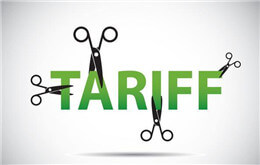On January 11, 2018, the ministry of commerce's press spokesman said at a regular briefing. As of now, China has implemented 15 free trade agreements, covering 23 countries, regions, and more than 8,000 zero-tariff import products. From the point of view of the free trade agreement that has already been signed, the total tariff rate of products with zero tariff is more than 90%.

For example, with the implementation of the free trade agreement, consumers can enjoy products from different producing areas and high quality and low prices throughout the year.
For instance, tropical fruits such as the durian, litchi and dragon fruit of ASEAN are reduced to zero tariff from 15% to 30%.
The import tariff on Icelandic salmon is reduced from 10% - 12% to zero tariffs.
Import duties on red wine of Georgia and Chile fell from 14% - 30 % to zero.
And New Zealand's beef and milk powder and other featured agricultural products enjoyed a large tax reduction.
Take industrial products for example, the import tariff on some cosmetics in Switzerland has been reduced to zero.
Tariffs on some watches have fallen by 50 per cent and will be reduced to zero in a few years. Tariffs on imports of refrigerators, rice cookers, massages and hairdressers in South Korea have fallen by 40 percent and will be reduced to zero in a few years. There are also big tax cuts on consumer electronics.
At the same time, under a free trade area of the zero tariff products also include many domestic terminal consumer goods manufacturing, intermediate products and raw materials needed to also to a certain extent, promoted the structure upgrading of consumer goods.
The Reason Behind The Zero Tariffs: Curb The Outflow of Consumption
According to the ministry of commerce, Chinese tourists spent about 1.2 trillion yuan overseas in 2015, consuming nearly 46 percent of the world's luxury goods. Chinese tourists spent $261 billion on outbound travel in 2016, up 12% from a year earlier, making it the world's most expensive tourist destination.
According to the China business news, China's import tariffs is among the highest across the world, plus with customs detection, store inspection and value added tax, consumption tax in the process of sales, making imported goods at least a third more expensive than their home country. Thus, lower import tax rates can leave much of the purchasing power at home.
Moreover, the reduction or exemption of tariff and special consumption tax will not only help increase imports and reduce trade surplus, but also expand domestic consumption and drive the overall development of high-end industries.

